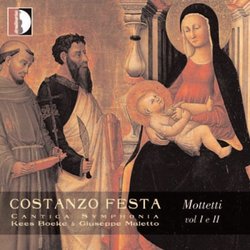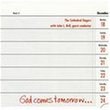| All Artists: Ermanno Lo Gatto, Marco Scavazza, Paolo Issoglio, Costanzo Festa, Cantica Symphonia, Anna Traversa, Daniel Perlongo, Elisa Franzetti, Laura Fabris, Roberta Giua, Sveva Martin, Alberto Allegrezza, Davide Longo, Fabio Furnari, Fabrizio Longo Title: Costanzo Festa: Mottetti Vol. I & II Members Wishing: 1 Total Copies: 0 Label: Stradivarius Original Release Date: 1/1/2006 Re-Release Date: 4/11/2006 Album Type: Import Genre: Classical Styles: Opera & Classical Vocal, Chamber Music, Historical Periods, Classical (c.1770-1830) Number of Discs: 2 SwapaCD Credits: 2 UPC: 8011570110015 |
Search - Ermanno Lo Gatto, Marco Scavazza, Paolo Issoglio :: Costanzo Festa: Mottetti Vol. I & II
 | Ermanno Lo Gatto, Marco Scavazza, Paolo Issoglio Costanzo Festa: Mottetti Vol. I & II Genre: Classical
Costanzo Festa (ca. 1490-1545) entered the service of the papal chapel in Rome in 1517 and remained there until his death. His surviving output includes four Masses, 30 hymns, a large quantity of madrigals, and more than 4... more » |
Larger Image |
CD DetailsSynopsis
Album Description Costanzo Festa (ca. 1490-1545) entered the service of the papal chapel in Rome in 1517 and remained there until his death. His surviving output includes four Masses, 30 hymns, a large quantity of madrigals, and more than 40 motets. Festa was one of the principal composers in the generation of early madrigalists. Cantica Symphonia?s edition of these works has been greeted with critical acclaim. The group is a vocal and instrumental ensemble made up of seasoned early music specialists. Similar CDs
|
CD ReviewsThe Italian Josquin? Giordano Bruno | Wherever I am, I am. | 11/24/2008 (5 out of 5 stars) "Costanzo Festa (c. 1490 - 1545) had the dubious honor in his lifetime of having some of his works attributed to Josquin Desprez, Jean Richafort, and Ludwig Senfl. He was not unique in that; in the semi-deification of Josquin after his death, any number of compositions, both worthy and unworthy, were ascribed to Josquin. There's one important difference, however; none of the Festa works would have embarrassed Master Desprez. Festa was the only Italian composer of his generation who fully comprehended and employed the arts of the great Franco-Flemish polyphonists, and he stands alone on a par with the best of them.
So then, does Festa sound like Josquin? Hmmm. Does one fine wine taste like another? Do all roses smell alike? Josquin's music is almost abstract in its serenity. Festa's is more immediate in both warmth and sorrow. Josquin wrote music perfect enough for God; Festa wrote music expressive enough to touch the human heart -- broader in its effects, more dramatic, less ethereal. Four of Festa's motets were included in the Medici Codex of 1518, the great compilation prepared in France as a wedding gift for the marriage of Lorenzo II to Madelein of Auverge. What the Hall of Fame is to baseball, or Mount Rushmore to Presidents, the Medici Codex is to composers of the 15th Century, the certification of greatness. The two CDs by Cantica Symphonia were previously released separately. Be careful of duplication. Cantica Symphonia includes eight singers, all rightfully soloistic, plus a small choir for one motet, Regem Regum Dominum, as well as a trombone and/or vielle to play the long-note cantus firmus lines on several motets. Thus the usual voicing is two-on-a-part or one-on-a-part. Either way, the singing is elegantly transparent and expressively independent, unfurling each line of the four to six part polyphony in its own rhetorical eloquence. Most of the higher cantus parts are sung by women sopranos but their voices blend seamlessly with those of the male altos, tenors and basses. High marks to the trombonist Mauro Morini, also, for blending tunefully and playing his horn as vocally as possible! Altogether, this is a fabulous performance of very fine music -- a recording not to be missed!" |

 Track Listings (11) - Disc #1
Track Listings (11) - Disc #1


